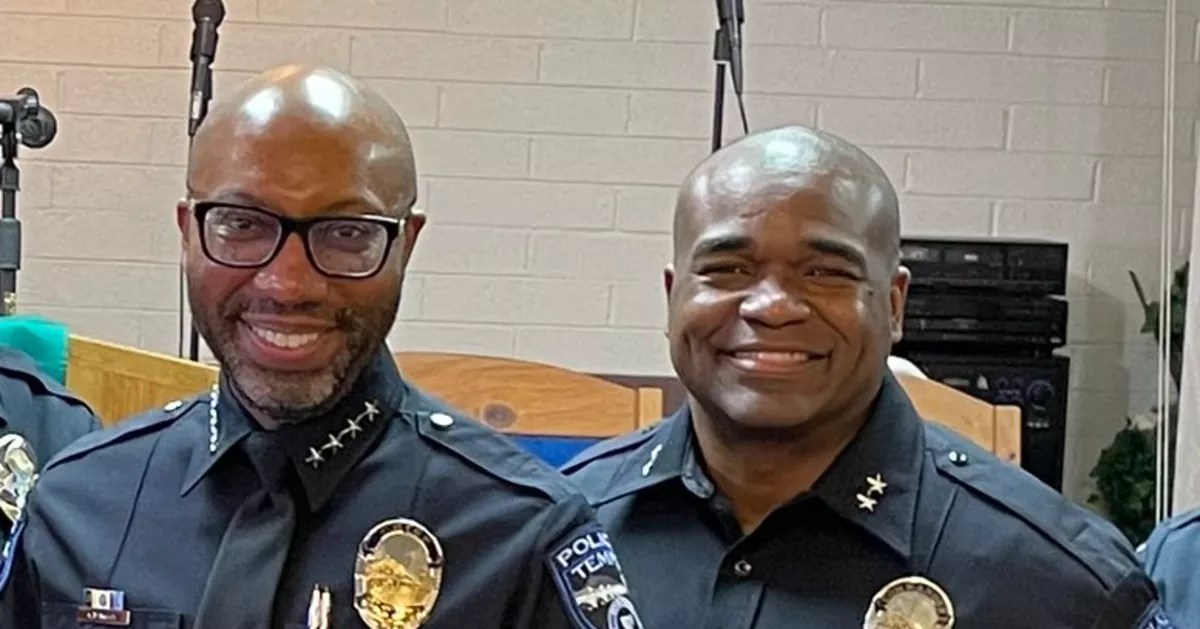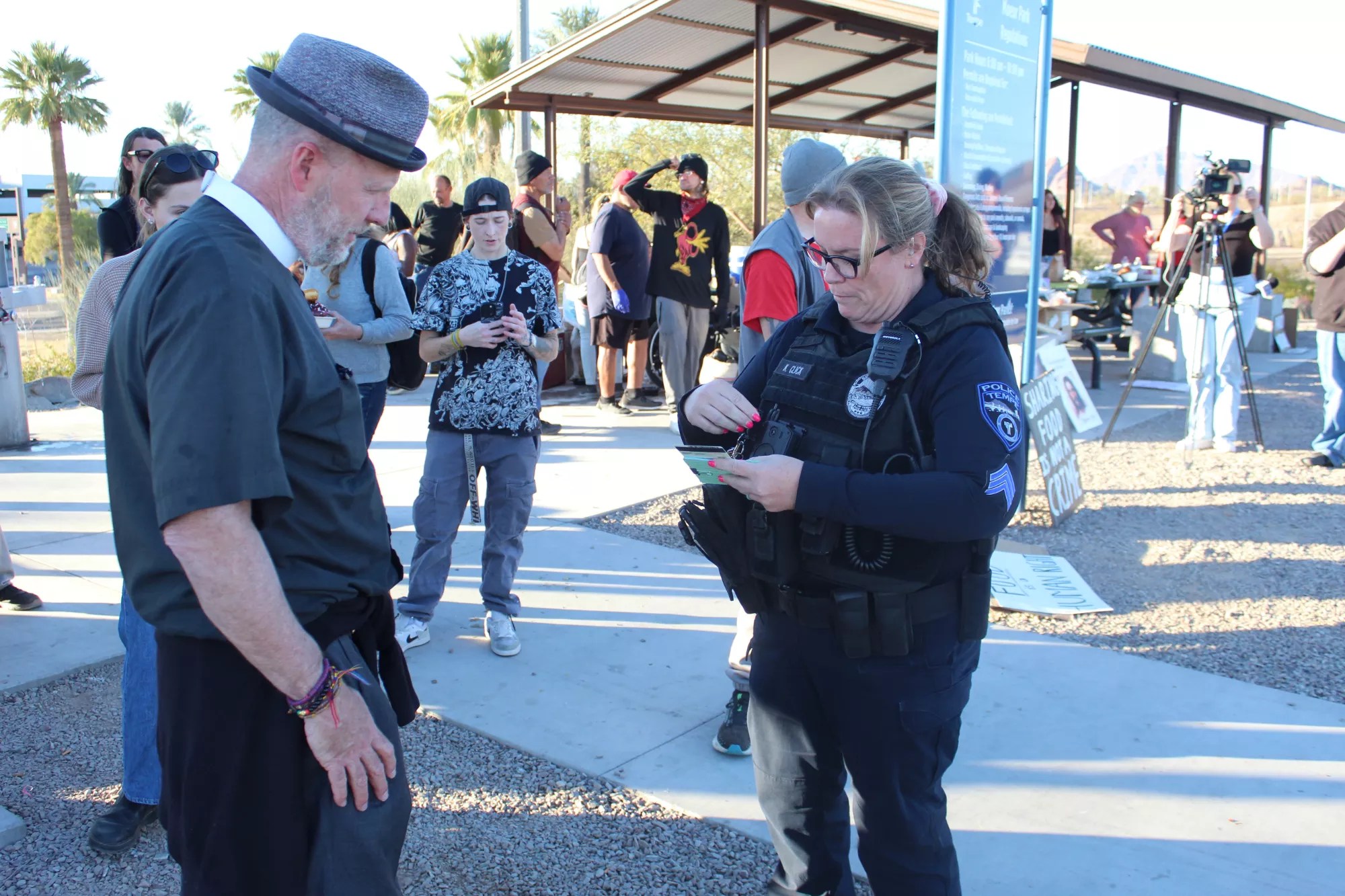
Tempe Police Chief Kenneth McCoy X Page

Audio By Carbonatix
Editor’s note: This story has been updated to include responses from Tempe police Chief Kenneth McCoy, City Manager Rosa Inchausti, Chief Deputy City Manager Greg Ruiz, Assistant Police Chief Dane Sorensen and Andre Miller, the Arizona vice president of the NAACP.
***
For well over a year, top officials in Tempe have battled residents feeding the homeless in city parks. But in a remarkable new whistleblower report, one of the city’s top cops alleged that the force’s chief was helping them out – in violation of Arizona law.
On Wednesday, a lawyer for Tempe police Commander Rashidi Johnson sent a letter to the Arizona Department of Public Safety alleging that Tempe Police Chief Kenneth McCoy consistently and improperly provided top Tempe officials with information from the Arizona Criminal Justice Information System (ACJIS), which is intended to be used only by law enforcement officers.
The letter, obtained by Phoenix New Times, formally asks the Department of Public Safety, which oversees the data system, to investigate McCoy and Tempe for mishandling sensitive law enforcement data “unrelated to a lawful criminal justice function.” The Arizona Department of Public Safety has not yet told Phoenix New Times whether it received the letter.
City officials strenuously denied the allegations in the letter, accusing Johnson’s attorney, Larry Henke, of conducting a “calculated attempt to mislead, to inflame, and to harm.”
The letter’s allegations implicate McCoy as well as Tempe City Manager Rosa Inchausti and her chief deputy, Greg Ruiz.
“The City of Tempe City Manager was given access to and provided information from ACJIS in her personal efforts to initiate a campaign of harassment and selective enforcement against two citizens who were homeless advocates and had a program of feeding the homeless in City parks – Austin Davis and Ron Tapscott,” Johnson’s lawyer, Larry Henke, wrote in the letter.
Davis and Tapscott are currently suing the city in federal court, claiming Tempe violated their civil rights by criminalizing their efforts to feed unhoused people in public parks. Davis has been hauled into court, arrested, jailed and banned from parks – though that ban ended on Wednesday. Tapscott faced a charge for feeding the homeless without a permit, though it was later dropped.
McCoy denied the allegations in a statement sent to New Times.
“The claims in Mr. Henke’s letter are categorically false, defamatory, and wholly unsupported by facts,” the statement read. “At no time have I, nor any member of the Tempe Police Department under my direction, provided ACJIS or any other law enforcement-sensitive information to the City Manager, Deputy City Manager, or any unauthorized individual for political purposes or selective enforcement. To state otherwise is not only baseless, but also a reckless distortion that undermines the integrity of public safety professionals across this state.”
Inchausti also denied the letter’s allegations: “I have never requested, nor have I ever received, information regarding Austin Davis or Ron Tapscott from an ACJIS database. There is no ‘campaign of harassment’ against Davis, Tapscott, or any Tempe resident – full stop. Any allegation to the contrary is a flat-out lie.”
Henke’s letter claims Inchausti lobbied Assistant Chief Dane Sorensen to start tracking demographic data on unhoused people to “determine the whereabouts of the homeless.” At the time, the department did not gather such data on homeless people “for legal reasons,” the letter stated.
In a statement to New Times, Sorensen denied the allegation: “I have never shared ACJIS information with anyone who is not authorized – ever. I have not been requested to provide ACJIS information to City Manager Rosa Inchausti, nor
have I given it to her – or any unauthorized person.”
Henke’s letter claims many of the department’s top officers were opposed to the city’s top official tracking such data because it was “discriminatory to base police tracking of a demographic simply based on their homeless status.” In addition, ACJIS information is typically reserved for law enforcement officers with authorization to access the system.
“The sentiment from police personnel was universal – they were all uncomfortable with this process because this information had never been reported out to civilians, let alone civilians that do not possess ACJIS credentials,” the letter notes. Nevertheless, the letter claims that because Incahusti ordered that data to be collected and provided to her and Ruiz, it was done.
Inchausti told New Times she is not authorized to access AJCIS information “independently” and has never requested any such information. “Every accusation contained in this letter, apparently sent by an attorney busy threatening to sue the City of Tempe on additional trumped-up allegations, is absolutely, unequivocally false,” Inchausti wrote.
Ruiz told New Times that he is authorized to receive AJCIS information but that he has “never requested or received AJCIS information regarding any single individual” or information “on the unsheltered community.”
In his statement, McCoy wrote that Henke’s letter “includes outrageous fabrications and misleading assertions regarding the operations of the Tempe Police Department and the conduct of City leadership. The allegations that our department has engaged in unlawful tracking, misuse of confidential information, or the politicization of police resources are offensive, unfounded, and in direct contradiction to our agency’s policies, oversight mechanisms, and long-standing commitment to ethical policing.”
On Friday, Tapscott called for the Tempe City Council – which can’t be said to be a huge fan of his – to terminate its contract with Inchausti and hire independent organizations to investigate her and the Tempe Police Department.

Tempe City Manager Rosa Inchausti.
City of Tempe
City manager implicated
In his letter, Henke claimed that McCoy signed off on and oversaw the sharing of the sensitive police data with city officials against the wishes of other top officers.
“The dissemination of confidential ACJIS information to non-law enforcement personnel became so prevalent that Chief McCoy systematized the disclosure,” the letter states. “McCoy created a quarterly department report-out meeting where Asst. City Manager Greg Ruiz was present at a regular meeting where every division of the police department reported out confidential information.”
The letter alleges that the department provided ACJIS information to Inchausti and Ruiz that included personal information on suspects and unhoused people.
Inchausti denied receiving ACJIS data and said the city “certainly did not order TPD personnel to engage in a ‘discriminatory’ policy of ‘police tracking of a demographic simply based on their homeless status.'” McCoy said that “the suggestion that I ‘systematized’ the disclosure of ACJIS information is not only false, but also a malicious attempt to tarnish my character and that of the dedicated men and women I serve alongside.”
Tempe Mayor Corey Woods did not respond to questions from New Times about the allegations. Woods has praised Inchausti publicly, including on June 5 when the council voted unanimously to upgrade her salary by more than $50,000 to $370,000.
Woods has insinuated that opposition to Inchausti and her pay raise was based on sexism, which has irritated some Tempe residents who have taken issue with Inchausti’s crackdown on homeless people and those who help them.
“She has, from my perspective, done an incredible job,” Woods said. “I don’t believe, quite honestly, that she sleeps.”
The letter contains details about Inchausti’s alleged operations.
Henke wrote that he has messages that show Inchausti directed Tempe police’s Threat Mitigation Unit, which mines data for terrorist threats, to surveil Davis and Tapscott so that the city could keep tabs on where they were feeding the homeless.
The letter claims Inchausti allegedly worked with Sorensen, the assistant chief, to stay informed about Davis’ activity. Weeks before Davis’ arrest in July 2024, Sorensen allegedly texted a colleague about the situation in Papago Park, where Davis and his organization fed unhoused people. It read: “How is Papago? I have a 0800 meeting tomorrow with Rosa and/or Greg.”
Sorensen told New Times that at the time, “the park was a concern for the city due to crime occurring in and around it. It is the responsibility of Tempe Police to address crime and do criminal justice work to keep our city safe. That is exactly what
we did.”
Henke’s letter also claims Inchausti “routinely asked for the names of officers and detectives involved in confidential or undercover operations, and McCoy willingly provided this environment despite the violations of ACJIS and safety to all employees at the police department.”
Additionally, Johnson and Henke allege that McCoy and the department violated an Arizona law that bars “knowingly disclosing or misusing confidential records (such as ACJIS data) outside lawful duties may also be prosecuted as official misconduct or unlawful use of confidential information.”
In his statement, McCoy said, “As Chief of Police, I will not allow false accusations to stand unchallenged, especially those that malign the professionalism of our department and suggest impropriety where none exists.”

Tempe and its police department have battled groups feeding homeless people in city parks, though tensions have cooled in recent months.
TJ L’Heureux
Discrimination complaint
This isn’t the first time Johnson, the whistleblowing commander, has aired allegations against the Tempe Police Department.
In February, Johnson and Henke sent a complaint to Arizona Attorney General Kris Mayes, alleging McCoy and the department had engaged in racial discrimination when they went against protocol and selected Johnson to investigate the arrest of a Black Chicago police officer in August 2024. Johnson, who is Black, claims he was selected for the investigation because of his race and that Internal Affairs should have been chosen to investigate instead.
The complaint also alleges that after Johnson was removed from the investigation weeks later, he underwent months of harassment, discrimination, and retaliation, and that McCoy interfered with an ongoing internal investigation about Johnson.
The complaint says that text messages allegedly show that McCoy, who is also Black, enlisted the help of Andre Miller, the Arizona vice president of the civil rights organization National Association for the Advancement of Colored People, to pressure Johnson into cutting a deal.
“Accept a conversation today with Chief, no attorney,” Miller texted Johnson on Feb. 18. “It’s happening today!! No ATTORNEY.”
However, Miller’s version of events is different. He told New Times that Johnson actually contacted him to try to set up a meeting with McCoy via text message. When New Times asked to see the texts in question, Miller said the conversation actually took place on a call.
Richie Taylor, the communications director for Mayes’ office, told New Times he was working on obtaining the status of the complaint.
In May, Johnson filed a notice of claim against the department, which is a precursor to a lawsuit. No lawsuit has been filed yet – Henke said Johnson submitted a claim to the Equal Employment Opportunity Commission. He cannot sue until the EEOC issues a finding in the case.
Tempe has disputed Johnson’s discrimination claim.
Johnson also asked the Arizona Peace Officer Standards and Training Board to investigate McCoy over a variety of what he says is “illegal conduct.” AZPOST Executive Director Matt Giordano – who will soon take office as chief of the Phoenix Police Department – said AZPOST has an open inquiry into that complaint but is awaiting documents from Tempe police.